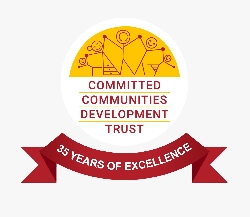Committed Communities Development Trust (CCDT), a 35-year-old NGO based out of Bandra (West). For 35 years, CCDT has stood as a beacon of hope, compassion, and resilience. From transforming vulnerable communities to
advocating for child rights, maternal and child health, and adolescent and youth empowerment, CCDT’s journey is a powerful testament to the impact of grassroots action and unwavering commitment.CCDT has been working with the most marginalized and vulnerable communities across Maharashtra and has gone to the last mile to reach children and families in crisis. Over the last 3 decades CCDT has impacted the lives of more than 2 million individuals through its various programs and interventions. CCDT is committed towards taking forward the national and state agenda of equal opportunities for children and their families and safeguarding their rights to live with dignity. Aligning its initiatives with the Sustainable Development Goals set down by the United Nations, CCDT works on rights and needs-based approaches to empower the most deprived communities, and consequently facilitates sustainable social change. These approaches build on our strategic partnerships, anchored over the years, with the continual involvement and contribution of our donors, strategic partners and stakeholders in our quest to achieving the goal of equality and justice for all children in the context of their families. We have always believed in addressing issues at the community level that emerges out of their need, keeping children at the Centre of the universe. Working with children in isolation, does not lead to sustainable impact. Therefore, CCDT adopted the approach of engaging multi stakeholders to provide quality care for the best interest of the children and deliver impactful outcomes. Our focus is primarily our direct and indirect stakeholders -children, adolescent and young people, particularly girls and young women from underprivileged and vulnerable communities who are at risk.
Appeal
Despite concerted efforts by the government, the poor immunization status of cervical cancer vaccine and the poor uptake seem to be unrelenting. A number of reasons have been identified and these include lack of awareness, communication gaps, target population not aware of requirement of vaccine and follow up doses, myths and misconceptions regarding vaccine among the underserved community, fear of adverse reactions following immunization, rumours, lack of faith in functionaries and so on. Efforts are negligible when it comes to promote the vaccine from government machineries. Therefore, there is an urgent need to understand why there is a persistent poor uptake of routine immunization interventions particularly in the underserved community amongst adolescents. CCDT proposes to develop innovative tools to address the problem, demonstrate model community mobilization program, build capacity of ASHA, Anganwadi and community mobilizers and increase the uptake of cervical cancer vaccine. The proposed intervention will address improving immunization seeking behaviour (less refusal for immunization), creating demand for cervical cancer vaccine by providing last mile connectivity through Community Mobilisers and Supervisors and liaising with the Health Machinery for creating an enabling environment. CCDT will take the health and education system along to drive the initiative.


